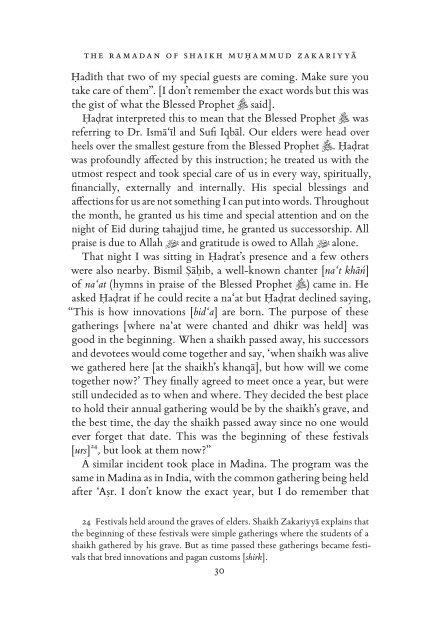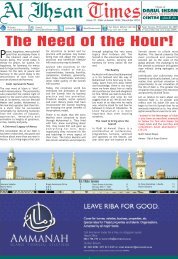TheRamadan of Shaykh Al-Hadith Ml ZakariyyaKandelwi by Dr Muhammad Ismail Memon Madani
TheRamadan of Shaykh Al-Hadith Ml ZakariyyaKandelwi by Dr Muhammad Ismail Memon Madani
TheRamadan of Shaykh Al-Hadith Ml ZakariyyaKandelwi by Dr Muhammad Ismail Memon Madani
You also want an ePaper? Increase the reach of your titles
YUMPU automatically turns print PDFs into web optimized ePapers that Google loves.
the ramadan <strong>of</strong> shaikh muĤ ammud zakariyyĀ<br />
Ĥadīth that two <strong>of</strong> my special guests are coming. Make sure you<br />
take care <strong>of</strong> them”. [I don’t remember the exact words but this was<br />
the gist <strong>of</strong> what the Blessed Prophet s said].<br />
Ĥađrat interpreted this to mean that the Blessed Prophet s was<br />
referring to <strong>Dr</strong>. Ismā‘īl and Sufi Iqbāl. Our elders were head over<br />
heels over the smallest gesture from the Blessed Prophet s. Ĥađrat<br />
was pr<strong>of</strong>oundly affected <strong>by</strong> this instruction; he treated us with the<br />
utmost respect and took special care <strong>of</strong> us in every way, spiritually,<br />
financially, externally and internally. His special blessings and<br />
affections for us are not something I can put into words. Throughout<br />
the month, he granted us his time and special attention and on the<br />
night <strong>of</strong> Eid during tahajjud time, he granted us successorship. <strong>Al</strong>l<br />
praise is due to <strong>Al</strong>lah u and gratitude is owed to <strong>Al</strong>lah u alone.<br />
That night I was sitting in Ĥađrat’s presence and a few others<br />
were also near<strong>by</strong>. Bismil Śāĥib, a well-known chanter [na‘t khāń]<br />
<strong>of</strong> na‘at (hymns in praise <strong>of</strong> the Blessed Prophet s) came in. He<br />
asked Ĥađrat if he could recite a na‘at but Ĥađrat declined saying,<br />
“This is how innovations [bid‘a] are born. The purpose <strong>of</strong> these<br />
gatherings [where na‘at were chanted and dhikr was held] was<br />
good in the beginning. When a shaikh passed away, his successors<br />
and devotees would come together and say, ‘when shaikh was alive<br />
we gathered here [at the shaikh’s khanqā], but how will we come<br />
together now?’ They finally agreed to meet once a year, but were<br />
still undecided as to when and where. They decided the best place<br />
to hold their annual gathering would be <strong>by</strong> the shaikh’s grave, and<br />
the best time, the day the shaikh passed away since no one would<br />
ever forget that date. This was the beginning <strong>of</strong> these festivals<br />
[urs] 24 , but look at them now?”<br />
A similar incident took place in Madina. The program was the<br />
same in Madina as in India, with the common gathering being held<br />
after ‘Aśr. I don’t know the exact year, but I do remember that<br />
24 Festivals held around the graves <strong>of</strong> elders. Shaikh Zakariyyā explains that<br />
the beginning <strong>of</strong> these festivals were simple gatherings where the students <strong>of</strong> a<br />
shaikh gathered <strong>by</strong> his grave. But as time passed these gatherings became festivals<br />
that bred innovations and pagan customs [shirk].<br />
30



